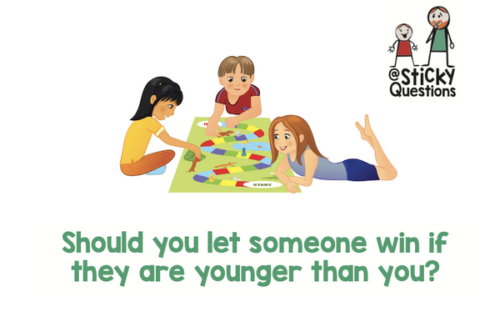Moral dilemmas tap into our intuitive senses of right, wrong, fairness, and justice. They also encourage us to weigh up contextual factors like consequence, time and motives.
Philosopher Rushworth Kidder believed there are four types of moral dilemma. This week, explore Truth vs Loyalty, and Justice vs Mercy; next week, Individual vs Community and Short term vs Long term.
Dilemma 1: Truth vs. Loyalty
Max was going on holiday, so he took his gerbil, Mr Fluffernutter, to stay with his friend Tim. Tim asked his sister Anna to help him since he wasn’t good with animals. Plus, Mr. Fluffernutter was a feisty little thing and often difficult to handle.
On the first day, Tim accidentally left the door open and Mr Fluffernutter escaped. Tim and Anna searched for hours but could not find him anywhere. Anna wanted to tell Max but Tim begged her to not say anything.
They eventually found him two days later, in a shoebox he’d bitten a hole through. He looked a little rough, his fur all messed up and his eyes a little bit red. They put him back in his cage. Feeling guilty, Tim tried to clean the cage, but accidentally used a cleaning product that was toxic to gerbils. Mr Fluffernutter started wheezing and coughing, and Tim was worried that he had seriously injured him.
Max returned from holiday to collect Mr Fluffernutter. The siblings were conflicted about what to do. Tim insists he won’t tell Max, and says Anna should be loyal to him and not tell Max either.

Should Anna tell Max?
How should she decide what to do?
What if they come up with an alternative explanation and Max still goes to the vet?
Can “be loyal to your family” be a rule for deciding what is right?
Can “tell the truth” be a rule for deciding what is right?
How can you decide between loyalty and truth?
Dilemma 2: Justice vs Mercy (small scale)
Ask them to imagine that tonight, X steals £50 from their mum. Their mum believes they must have lost the money and so they get away with it, but only for the time being. Here the story splits into several possibilities, in each of which they are found out, but following different periods of time after the initial theft:
1 month
1 year
5 years
10 years
50 years
In which of these possible worlds should they be punished for the theft?
At what point are they no longer responsible for the theft?
Is the quantity of money stolen relevant? If it were more, would the theft cast a longer shadow?
What’s more important – punishment or compensation?
Do you think your answers would have been different if the dilemma had asked you to imagine YOU were the thief?
Scale Models
Dilemmas 2 & 3 are an example of the “Scale model” approach to P4C. The idea is to have two stimuli, one on a small, relatable scale such as a domestic setting, followed by the “full size” stimulus from a more adult topic. If it’s appropriate to do both, do your students come to similar conclusions in both examples, or do their opinions change? Learn more about scale models in this bulletin from 2019.
Dilemma 3: Justice vs Mercy (large scale)
The full-scale dilemma here relates to the Holocaust. It goes without saying that there’s no intention to trivialise here. Philosophically, there’s a question of whether normal principles of mercy break down in such extreme circumstances, or whether mercy can itself be a repudiation of such inhumanity.
Oskar Groning, known as the Bookkeeper of Auschwitz, who was put on trial aged 94 for being an accessory to the murder of 300,000 people. Read more about him, and the case, here. He was given four years in prison, but died while legal appeals were still being made. It might be best to withhold this from your class at first: what has happened is not necessarily what should have happened.

What considerations should you make?
In making a decision, how important a factor is:
- His age
- That he joined the Hitler youth as a teenager
- That he was influenced by his father
- The he says he is now sorry
- That he has wanted the truth of Auschwitz to be known
- How much time has passed
- The huge scale and horror of what happened: does that put him beyond mercy?
Is the old man responsible for the young man’s crimes?
Finding dilemmas
Even the thinnest story can captivate a class – and even better if it’s from your life and told in the first person. When I facilitated some of these at Whitgift School last week, I warmed things up with recent dilemmas involving my own family. Do I tell my little sister that it wasn’t actually Jamie Oliver who tweeted her back, but a member of his social media team?
A common response from children is “well it depends if…” before illuminating what they don’t yet know about the story. We’ve a couple of options here: if it’s factual context you know (or are happy to invent and stick to), fill them in. Alternatively, “park the facts” – “If my sister would be really upset to find out, then what?”
When we ran these with our online Philosophy classes at p4he.org, one child identified the potential for differences between when you are in a dilemma in real life, when you are imagining yourself in a dilemma, or when you are discussing someone else’s dilemma. Do you think differently?
Sticky Question of the week

Order your Summer P4C Taster Pack now and get:
- A whole term of Sticky Questions (for 210 children for 13 weeks)
- A copy of David Birch’s Thinking Beans: A Year of Classroom Philosophy Sessions
- The brand new Philosophers’ Kitchen – our six favourite easy-win activities with at least six examples for different ages, over 40 sessions in all!
- Access to a live, online Zoom training session that your whole staff can attend (or to an on-demand alternative that you can view at your leisure).
Best wishes,
Tom, Jason and Marley
PS: If any smart Alec tries to tell you that dilemma is actually spelt dilemna – it’s a myth that somehow found its way into spelling lessons. Experts think it originated from a typo in a book ironically about spelling published in 1868.
PPS: A “fluffernutter”, in case you are wondering, is a peanut butter and marshmallow sandwich!
Never miss a resource! Get these P4C ideas sent straight to your inbox every week for free.